Dick Oxtot Session, Berkeley, early-1960s
Goudie became an associate of Dick Oxtot (1918-2001) and was often present at his home on Dwight Way in Berkeley for jams, rehearsals and recording sessions. Frank praised Dick’s skilled rhythm banjo technique.
A notable series of sessions featuring singer Janis Joplin were taped at bars and the Oxtot residence. Despite the rawness of her voice, Joplin had an earthy feeling for the blues and talent transcending her technical limitations. Years before her Rock ‘n Roll fame, Oxtot and his wife Darylene briefly but unsuccessfully attempted to groom Joplin as a jazz vocalist.
After Joplin died, a tribute album containing some of her early folk, blues and jazz material was issued. Selling over a million copies, “Janis” included tracks acquired from the Oxtot sessions. But on the disc, all the horn solos including Goudie’s were edited out.
Another fine Oxtot session features Frank with trombone player Jim Leigh, and cornetist Walter Yost — who was better known as a tuba player. Popular among these musicians, “Gee, Baby, Ain’t I Good to You” was a natural vessel for Frank’s rich blues variations.
Dick Oxtot’s Home, Berkeley, CA c. 1962
Frank Goudie (clarinet), Walter Yost (cornet), Jim Leigh (trombone), Bill Erickson (piano), Dick Oxtot (banjo, vocal), probably Pete Allen (string bass), Don Marchant (drums), Bret Runkle (washboard):
Gee, Baby, Ain’t I Good to You
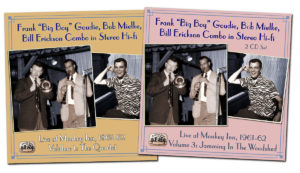
Nearly five hours of the Monkey Inn recordings are available from Frisco Jazz Archival Rarities/Grammercy Records.
Bill Erickson Monkey Inn Combo, Berkeley 1961-62
Monkey Inn was a casual beer and pizza joint in Berkeley where Goudie joined Erickson in a Thursday night combo with trombonist Mielke and drummer Jimmy Carter. Mielke describes a lively hangout for UC students bordering on tough — “football players and fraternity guys on their first beer bouts,” that could get “pretty rowdy.” At this stage Bob was a young and popular but rough-hewn talent. Alongside these more seasoned veterans he still had a lot to learn — by Goudie’s estimation and his own later admission.
New Orleans native Jimmy Carter played drums with Erickson at Monkey Inn and Pier 23. In his New Orleans days Carter had played with “Kid” Thomas, John Handy and “Kid Shots” Madison. Accurate and hard driving he added nuanced and unobtrusive punctuation.
SF-3 Mielke Monkey Inn Erickson I Found a New Baby.mp3
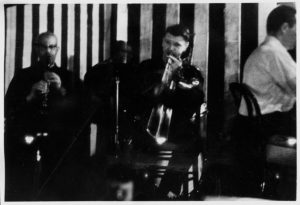
Bill Erickson’s Monkey Inn combo. L to R: Frank Goudie (clarinet), Jimmy Carter (drums), Bob Mielke (trombone) and Bill Erickson (piano), 1961-62.
These remarkable tapes are only slightly flawed by technical shortcomings and the intrusion of location sound. It was enthusiasts and fans Alvin and Barbara Bryant who made these excellent recordings with a pair of Telefunken microphones fed directly to a portable Ampex tape deck. Some five hours of Monkey Inn tapes are offered on three volumes of Frank Big Boy Goudie, Bob Mielke, Bill Erickson Combo in Stereo Hi-Fi from Grammercy Records and Frisco Jazz Archival Rarities, available on CD or download format on i-Tunes and Amazon.com.
The full-fidelity stereo audio from Monkey Inn is the best pickup we have of Goudie’s clarinet, an intimate portrait of the mature artist. With room to stretch out, his expressive improvisations unfold like blossoms in masterful solos. Erickson’s easy musical rapport with Frank is apparent, his genius undeniable despite the sorry wreck of a piano.
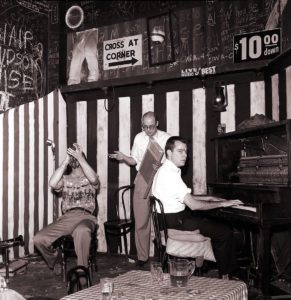
Erickson — and the sophomoric decor at Monkey Inn — with Earl Scheelar (cornet) and Bret Runkle (washboard). Photo by William Carter, 1962.
Right next to the tired, poorly tuned upright were the audibly swinging saloon doors opening onto busy Shattuck Avenue. Note that external audio leaked into “Careless Love” when a Harley V-twin motorcycle started up and pulled away. Another reminder that according to Mielke, “things could get a little rough.”
“Joseph, Joseph” was a specialty of this combo, summarizing their creativity, skill and verve; no less than five renditions are found among the surviving tapes. Mielke contends that this 1940s hit song for the Andrews Sisters’ was adapted from Jewish folk music.
“Diga Diga Doo” is Duke Ellington from before 1930. Added on the last two tracks is the superb trumpet player Jerry Blumberg. His intriguing style tastefully fused the New Orleans grit of Bunk Johnson with the New York sophistication of Bobby Hackett.
Bill Erickson combo, Monkey Inn, Berkeley, CA 1961-62
Frank “Big Boy” Goudie (clarinet), Bob Mielke (trombone), Bill Erickson (piano), Jimmy Carter (drums), add Jerry Blumberg (trumpet)
Willie the Weeper
Joseph, Joseph
Careless Love
Diga Diga Doo
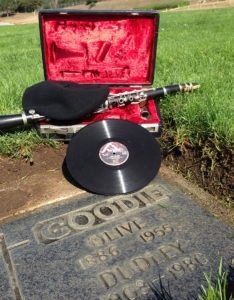
Today, Goudie rests on a gently sloping hillside near San Francisco. He shares a grave plot with his sister Olive and brother Dudley. Frank’s name is not on the gravestone, which bears the name Goodie, a common variant.
Eulogy for a Gentleman of Jazz
In late 1963 Goudie fell sick and was hospitalized. He died of lung cancer January 9, 1964. There was little note of his passing, except for Richard Hadlock who drew on his interviews and their personal friendship to write a sincere eulogy.
Published in the San Francisco Examiner, it was a fitting tribute to his remarkable journey spanning two thirds of jazz history and three continents:
“On the job, or even in jam sessions, other musicians soon learned to listen to Goudie’s quiet suggestions. They were based on a long lifetime of playing music, from New Orleans to Paris, from Rio de Janeiro to Prague.
In the New Orleans tradition, he tried to make every phrase count. He had done just the same in Europe, where he recorded with Django Reinhardt, and in South America, where he learned to play the real samba.”
SF-4 Hadlock Eulogy1964 & Just a Closer Walk, Pier 23.mp3
A Big Life
In his autumnal years, Goudie’s musical voice came to full fruition in the second wave of the great San Francisco jazz revival. He found fresh inspiration with skilled musicians who honored the traditions he’d lived by for decades. Formerly a mere footnote of jazz history, the broad scope of his talents, travels and achievements remains to be fully surveyed.
“Big Boy” was a big man who lived a big life — from New Orleans and Josephine Baker’s Paris to Rio, Berlin and the San Francisco waterfront. It’s now clear that he was a vanguard, exemplar and icon of jazz in the mid-Twentieth Century. Perhaps this retelling of his saga, recent research, CD titles and a fine new biography will help spread word of the colorful life, travels and music of Frank “Big Boy” Goudie.
The touching “Petite Fleur” was not well known in America in 1962. At Monkey Inn Mielke stepped aside for Frank’s valedictory expression of hushed passion.
Petite Fleur
Explore all four of Goudie’s jazz lives at the JAZZ RHYTHM website www.JAZZHOTBigstep.com. The music and images are from the Oxtot and Mielke collections in the Dave Radlauer Jazz Collection at the Stanford University Library archives.
Based on interviews, discussions and correspondence with Bill Bardin, Bill Carter, Dave Greer, Richard Hadlock, Bob Mielke and Darylene Oxtot. Great thanks to Richard Hadlock for his recollections, corroboration, photos and out-of-print San Francisco Examiner articles. Thanks also to Hal Smith for musical and editorial assistance.
See also: BIG BOY, The life and story of Frank Goudie, by Dan Vernhettes with Christine Goudie and Tony Baldwin (2015, Jazzedit.org). Heaven on the Side: A Jazz Life, Jim Leigh (2000, self-published). Goudie interview by Ken Mills 6.2.60 is at the Music Rising website of Tulane University.
Music from the Bob Mielke, Dick Oxtot and Dave Greer collections was transferred and mastered using J-corder Technics reel to reel, RME Fireface d/a, Bybee Quantum filtering and Pro Tools.
- ← Previous page
- (Page 4 of 4)

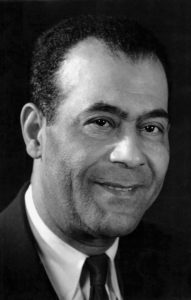
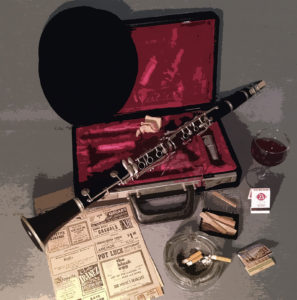
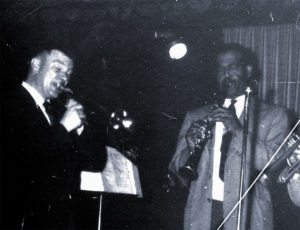
Goudie’s San Francisco music and associates may be further explored on CD and the web:
i-tunes – https://itunes.apple.com/us/artist/frank-big-boy-goudie/27045152
Frisco Jazz Archival Rarities http://www.jazzhotbigstep.com/560123.html
Frank Big Boy Goudie http://www.jazzhotbigstep.com/120601.html
Goudie in San Francisco http://www.jazzhotbigstep.com/227501.html
Bill Erickson http://www.jazzhotbigstep.com/249912.html
Dick Oxtot http://www.jazzhotbigstep.com/486423.html
Burt Bales http://www.jazzhotbigstep.com/284312.html
Janis Joplin-Dick Oxtot sessions http://www.jazzhotbigstep.com/428723.html
Pier 23 tapes http://www.jazzhotbigstep.com/295633.html
Dave-I did a 2 cd album called ‘West Coastin’ Tradjazz Productions TJP 2125. Jim Leigh’s El Dorado Jazz Band w/Frank ‘Big Boy’ Goudie ‘Live at Pete’s Chicago Club-1960. Now out of stock but I could make copies if anyone is interested.
Thanks Dick. Those are an excellent representation of Goudie playing in the prevalent New Orleans revival style.